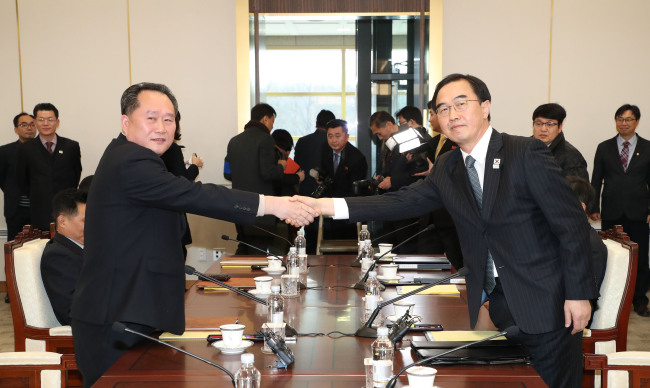South Korea will make efforts to hold regular inter-Korean high-level talks and offer humanitarian aid to North Koreans in need of assistance, the Unification Ministry said in a 2018 policy briefing.
 |
South Korea`s Unification Minister Cho Myoung-gyon (R) shakes hands with North Korean chief delegate Ri Son-gwon during their meeting at the border truce village of Panmunjeom in the Demilitarized Zone dividing the two Koreas on Jan. 9, 2018. (Yonhap) |
The two Koreas held high-level talks on Jan. 9, the first formal talks in more than two years, to hammer out details of the North’s participation in the Feb. 9-25 Winter Olympics. They agreed to continue such talks but fell short of agreeing to hold them on a regular basis.
“The government will seek regular high-level meetings to discuss ways to enhance inter-Korean relations comprehensively,” the ministry said.
The ministry aims to establish a virtuous cycle through such talks for an overall improvement in inter-Korean ties and progress on denuclearization talks.
Seoul is hoping that talks on the PyeongChang Olympics could go beyond the sporting event and eventually lead to US-North Korea talks on denuclearization.
Other forms of exchanges, including military talks and civilian exchanges, will also be encouraged.
Civilian inter-Korean religious, academic and cultural exchanges will be considered carefully within the boundaries of international sanctions. Exchanges to draw up a joint response to natural disasters will also be promoted within the same boundaries.
It also vowed to give further attention to humanitarian issues, including the reunion of families separated by the 1950-1953 Korean War and aid to the North.
In addition, it will work on its plan called the “New Economic Map Initiative of the Korean Peninsula,” which promotes cross-border economic cooperation between the two Koreas.
Last year, South Korean President Moon Jae-in said in Berlin that his administration aims to connect the South and the North, which have been divided by the military demarcation line, with an economic belt. It hopes for an economic community where the two Koreas can prosper together.
Seoul is preparing relevant plans to garner the North’s interest in such joint projects.
But concerns linked to the possibility of profits from economic collaboration being funneled to North Korea’s weapons program are expected to remain. International sanctions are currently imposed on the North to cripple its economic growth.
South Korea shut down the joint industrial complex in the border town of Kaesong in 2016 on suspicions its revenue was funding the North’s weapons development.
On reviving the reunion of divided families, South Korea initially proposed holding the event around the Lunar New Year holiday, which coincides with the Winter Games, in the series of recent talks. But North Korea has attached conditions to the offer.
Pyongyang is demanding Seoul return 12 female North Korean workers who worked at a restaurant in China and defected to South Korea in 2016. The South, however, refuses to do so, saying they defected of their own free will.
The ministry will also make efforts to revitalize humanitarian aid to the North, which has faced political obstacles due to the North’s ongoing provocations.
The liberal Moon administration has been struggling to set an appropriate time frame for the $8 million humanitarian aid plan it approved in September 2017, amid the North’s relentless military provocations. About $4.5 million is to go to the United Nations Food Program, while the rest would be managed by UNICEF for its vaccine and other health care programs. Both projects aim to alleviate poverty and sickness among North Korean children and mothers.
The administration has been stressing that humanitarian assistance should continue regardless of political or military considerations.
By Jung Min-kyung (
mkjung@heraldcorp.com)








![[Today’s K-pop] Blackpink’s Jennie, Lisa invited to Coachella as solo acts](http://res.heraldm.com/phpwas/restmb_idxmake.php?idx=644&simg=/content/image/2024/11/21/20241121050099_0.jpg)